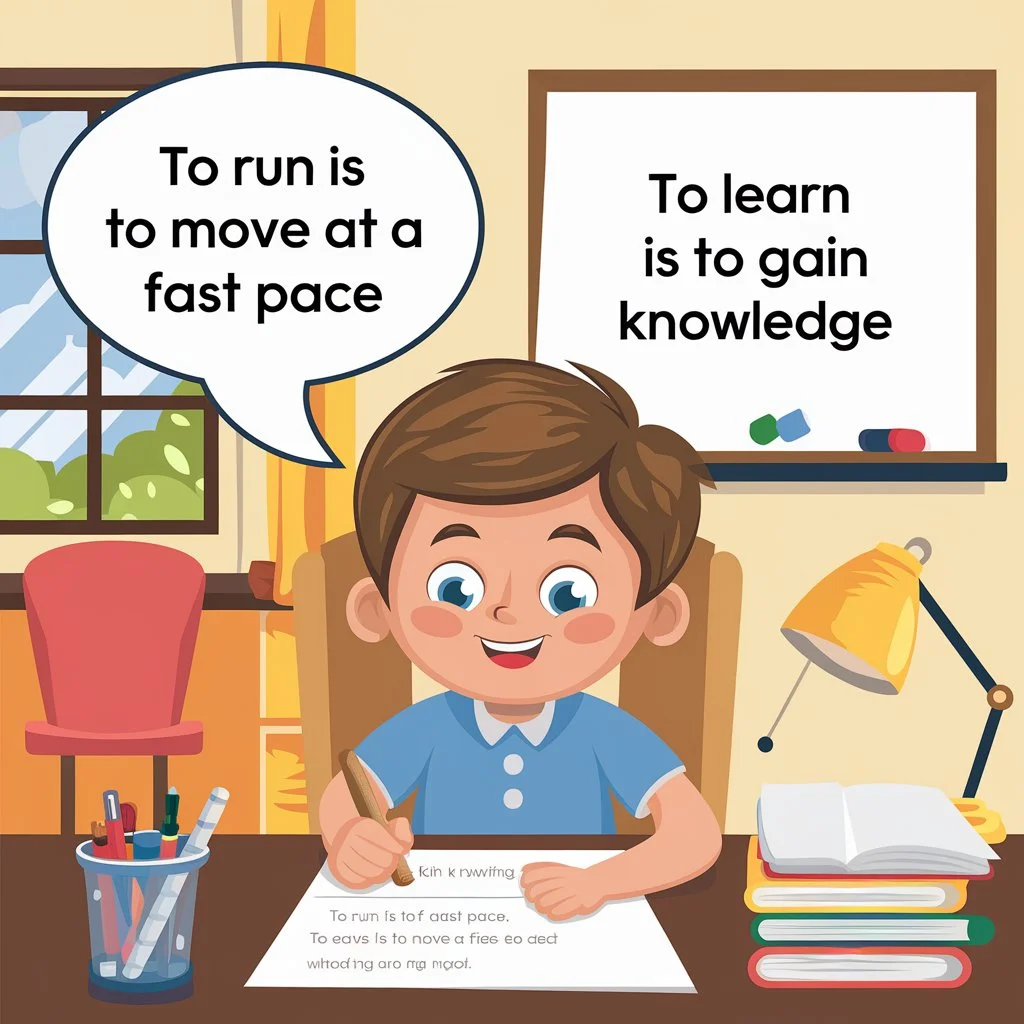Infinitive phrases are simple yet powerful tools in grammar that can transform your writing by adding clarity and variety. Whether you’re a student learning grammar for the first time or someone looking to polish your writing, mastering infinitive phrases will make your sentences more precise. Let’s take a deep dive into infinitive phrases, understanding their structure, uses, and how they can improve your writing.
What is an Infinitive Phrase?
An infinitive phrase is a group of words that begins with an infinitive verb and includes additional modifiers, objects, or complements to complete the thought. The most basic form of an infinitive verb is the base verb preceded by the word “to,” such as “to run,” “to write,” or “to speak.” When this infinitive verb is expanded with extra words, it forms an infinitive phrase.
Structure of an Infinitive Phrase
Infinitive Verb: The base verb with “to” (e.g., “to read”)
Modifiers/Objects: Words that add information to the infinitive verb (e.g., “to read a book,” “to read quickly”)
In the sentence “She wants to travel the world,” the infinitive phrase is “to travel the world.” It starts with the infinitive verb “to travel” and is followed by the object “the world.”
Examples of Infinitive Phrases in Sentences
– “He decided to write a novel.”
– “They plan to improve the system.”
– “We need to find a solution quickly.”
Each of these sentences contains an infinitive phrase that provides important information about the action being performed. These phrases can serve as nouns, adjectives, or adverbs in a sentence, giving them flexibility and making them an integral part of sentence construction.
How to Identify and Use Infinitive Phrases
Identifying and using infinitive phrases correctly can greatly improve the flow and precision of your writing. Here’s a guide on how to spot them and how they can be effectively used in various sentence structures.
Identifying Infinitive Phrases
To identify an infinitive phrase, look for the word “to” followed by a verb and any additional words that complete the phrase. The infinitive phrase will usually act as a noun, adjective, or adverb in the sentence.
For example:
– “She loves to sing beautifully.”
– Infinitive phrase: to sing beautifully (modifies “loves”)
– “His goal is to win the championship.”
– Infinitive phrase: to win the championship (modifies “goal”)
By breaking down sentences and isolating the infinitive verbs and their complements, you can easily identify these phrases.
Using Infinitive Phrases in Writing
Infinitive phrases can be used in different ways:
– As a Noun: The phrase acts as the subject or object of a verb.
Example: “To learn is important.”
– As an Adjective: The phrase describes a noun.
Example: “He has a book to read.”
– As an Adverb: The phrase describes a verb, adjective, or adverb.
Example: “She ran fast to win the race.”
In each of these cases, the infinitive phrase helps clarify meaning, making sentences more informative and interesting.
Difference Between Infinitive and Gerund
When studying infinitive phrases, it’s important to understand the difference between infinitives and gerunds. Both infinitives and gerunds are verb forms that can function as nouns in a sentence, but they have different structures and uses.
Infinitive vs. Gerund: Key Differences
– Infinitive: The base form of a verb with “to” (e.g., “to walk”).
– Gerund: The -ing form of a verb that functions as a noun (e.g., “walking”).
While infinitives can act as nouns, adjectives, or adverbs, gerunds are only used as nouns.
For example:
– “To run is his passion.” (Infinitive acting as the subject)
– “Running is his passion.” (Gerund acting as the subject)
When to Use Infinitive and Gerund
There are certain contexts where using an infinitive is more appropriate, and others where a gerund fits better. Gerunds are often used when the action is ongoing or habitual, while infinitives are used when the action is more theoretical or future-oriented.
For example:
– “She enjoys running.” (gerund—an activity she does regularly)
– “She wants to run.” (infinitive—a future or theoretical action)
Infinitive Phrase vs. Participial Phrase
Understanding how infinitive phrases differ from participial phrases is crucial to mastering sentence construction. Both types of phrases can modify or complete sentences, but they serve different purposes.
Defining a Participial Phrase
A participial phrase starts with a participle (a verb form that acts as an adjective) and includes any modifiers or objects. Participles typically end in -ing (present participle) or -ed (past participle).
For example:
– “The crying baby needed attention.”
– “The broken window was quickly repaired.”
In these sentences, “crying” and “broken” are participles describing nouns (“baby” and “window”). Participial phrases act as adjectives, providing more information about a noun.
Examples and Usage of Participial Phrases vs. Infinitive Phrases
Now, let’s compare infinitive phrases and participial phrases to see how they function differently in sentences:
– Infinitive Phrase: “She planned to paint the house.”
(The infinitive phrase “to paint the house” explains what she planned.)
– Participial Phrase: “Painting the house, she listened to music.”
(The participial phrase “painting the house” describes what she was doing while listening to music.
Practical Applications of Infinitive Phrases
Learning to use infinitive phrases effectively will enhance your writing. They provide clarity, add detail, and help structure sentences in a way that feels natural and easy to follow.
Using Infinitive Phrases in Daily Writing
Infinitive phrases can be used in:
– Formal Writing: Use them to introduce or describe objectives and actions.
Example: “Our goal is to improve communication within the company.”
– Storytelling: Infinitive phrases help provide clarity about a character’s actions or intentions.
Example: “She wanted to explore the mysterious cave.”
These phrases give your writing a more polished and professional tone while making it easier to convey complex ideas.
Common Mistakes to Avoid
While infinitive phrases are easy to use, some common mistakes can occur, such as:
– Splitting the Infinitive: Placing a word between “to” and the verb (e.g., “to quickly run”). This can sound awkward, so it’s better to avoid splitting the infinitive when possible.
– Misplacing the Phrase: The phrase should be placed close to the word it modifies to avoid confusion.
Incorrect: “She wanted to quickly eat dinner.”
Correct: “She wanted to eat dinner quickly.”
Infinitive Phrase Exercises
To practice identifying and using infinitive phrases, try the following:
– Identify the infinitive phrases in these sentences:
1. “He decided to buy a new car.”
2. “They agreed to meet at noon.”
– Rewrite these sentences using an infinitive phrase:
1. “I hope I will finish this project on time.”
2. “She is eager that she will start her new job.”
By practicing these exercises, you’ll get a clearer understanding of how to apply infinitive phrases effectively.
FAQs
What is an infinitive phrase?
An infinitive phrase starts with an infinitive verb (the base form of a verb with “to”) and includes other words to complete its meaning. For example, “to run quickly” is an infinitive phrase. It can act as a noun, adjective, or adverb in a sentence.
How do I identify an infinitive phrase in a sentence?
To find an infinitive phrase, look for the word “to” followed by a verb and extra words that complete the idea. For example, in the sentence “She loves to sing beautifully,” the phrase “to sing beautifully” is the infinitive phrase. It can describe actions or serve as a subject or object.
Can an infinitive phrase be used as a noun?
Yes, an infinitive phrase can act as a noun in a sentence. For example, in “To learn is important,” the infinitive phrase “to learn” is the subject of the sentence. It shows the action or thing being talked about.
What’s the difference between an infinitive and a gerund?
An infinitive is the base form of a verb with “to,” like “to run,” while a gerund is the -ing form of a verb, like “running.” Infinitives can act as nouns, adjectives, or adverbs, but gerunds only act as nouns. For example, “To swim is fun” (infinitive) vs. “Swimming is fun” (gerund).
Can infinitive phrases be split?
It’s best to avoid splitting an infinitive, which happens when you place a word between “to” and the verb. For example, “to quickly run” is a split infinitive, and it’s better to say “to run quickly.” Keeping the infinitive together makes your writing smoother.
Conclusion
Infinitive phrases are a crucial part of sentence construction that can enhance your writing by adding detail, clarity, and sophistication. Whether you’re using them as nouns, adjectives, or adverbs, they provide versatility in your sentences. By understanding how infinitive phrases differ from other grammatical structures like gerunds and participial phrases, you’ll have a greater command over your writing.

I’m Mira Sinclair, the expert helping you navigate grammar sections at “Grammer Grove.” Playing with words and expressions is my thing. At Grammer Grove, we’re here to make yourwriting stand out and shine. Let’s make your appreciation heartfelt and memorable—come and join the fun at Grammer Grove!












